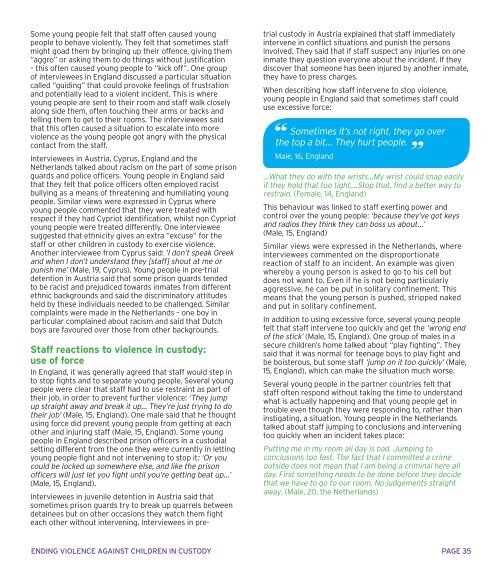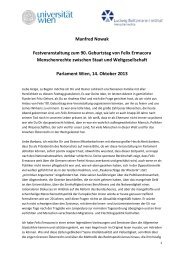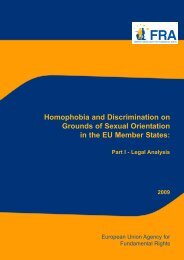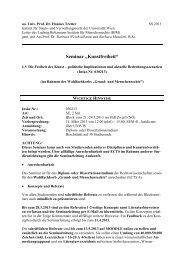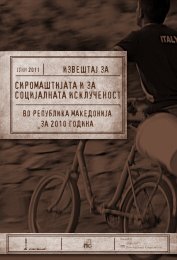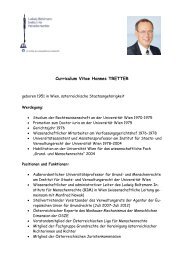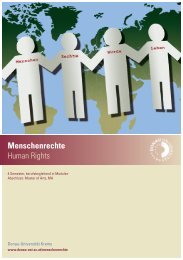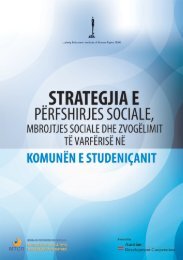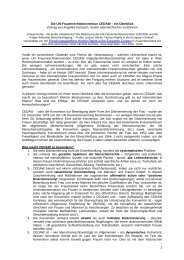speaking freely - 404 Page not found
speaking freely - 404 Page not found
speaking freely - 404 Page not found
You also want an ePaper? Increase the reach of your titles
YUMPU automatically turns print PDFs into web optimized ePapers that Google loves.
Some young people felt that staff often caused young<br />
people to behave violently. They felt that sometimes staff<br />
might goad them by bringing up their offence, giving them<br />
“aggro” or asking them to do things without justification<br />
– this often caused young people to “kick off”. One group<br />
of interviewees in England discussed a particular situation<br />
called “guiding” that could provoke feelings of frustration<br />
and potentially lead to a violent incident. This is where<br />
young people are sent to their room and staff walk closely<br />
along side them, often touching their arms or backs and<br />
telling them to get to their rooms. The interviewees said<br />
that this often caused a situation to escalate into more<br />
violence as the young people got angry with the physical<br />
contact from the staff.<br />
Interviewees in Austria, Cyprus, England and the<br />
Netherlands talked about racism on the part of some prison<br />
guards and police officers. Young people in England said<br />
that they felt that police officers often employed racist<br />
bullying as a means of threatening and humiliating young<br />
people. Similar views were expressed in Cyprus where<br />
young people commented that they were treated with<br />
respect if they had Cypriot identification, whilst non Cypriot<br />
young people were treated differently. One interviewee<br />
suggested that ethnicity gives an extra “excuse” for the<br />
staff or other children in custody to exercise violence.<br />
A<strong>not</strong>her interviewee from Cyprus said: ‘I don’t speak Greek<br />
and when I don’t understand they [staff] shout at me or<br />
punish me’ (Male, 19, Cyprus). Young people in pre-trial<br />
detention in Austria said that some prison guards tended<br />
to be racist and prejudiced towards inmates from different<br />
ethnic backgrounds and said the discriminatory attitudes<br />
held by these individuals needed to be challenged. Similar<br />
complaints were made in the Netherlands – one boy in<br />
particular complained about racism and said that Dutch<br />
boys are favoured over those from other backgrounds.<br />
Staff reactions to violence in custody:<br />
use of force<br />
In England, it was generally agreed that staff would step in<br />
to stop fights and to separate young people. Several young<br />
people were clear that staff had to use restraint as part of<br />
their job, in order to prevent further violence: ‘They jump<br />
up straight away and break it up… They’re just trying to do<br />
their job’ (Male, 15, England). One male said that he thought<br />
using force did prevent young people from getting at each<br />
other and injuring staff (Male, 15, England). Some young<br />
people in England described prison officers in a custodial<br />
setting different from the one they were currently in letting<br />
young people fight and <strong>not</strong> intervening to stop it: ‘Or you<br />
could be locked up somewhere else, and like the prison<br />
officers will just let you fight until you’re getting beat up…’<br />
(Male, 15, England).<br />
Interviewees in juvenile detention in Austria said that<br />
sometimes prison guards try to break up quarrels between<br />
detainees but on other occasions they watch them fight<br />
each other without intervening. Interviewees in pretrial<br />
custody in Austria explained that staff immediately<br />
intervene in conflict situations and punish the persons<br />
involved. They said that if staff suspect any injuries on one<br />
inmate they question everyone about the incident. If they<br />
discover that someone has been injured by a<strong>not</strong>her inmate,<br />
they have to press charges.<br />
When describing how staff intervene to stop violence,<br />
young people in England said that sometimes staff could<br />
use excessive force:<br />
Sometimes it’s <strong>not</strong> right, they go over<br />
the top a bit… They hurt people.<br />
Male, 16, England<br />
…What they do with the wrists…My wrist could snap easily<br />
if they hold that too tight….Stop that, find a better way to<br />
restrain. (Female, 14, England)<br />
This behaviour was linked to staff exerting power and<br />
control over the young people: ‘because they’ve got keys<br />
and radios they think they can boss us about…’<br />
(Male, 15, England)<br />
Similar views were expressed in the Netherlands, where<br />
interviewees commented on the disproportionate<br />
reaction of staff to an incident. An example was given<br />
whereby a young person is asked to go to his cell but<br />
does <strong>not</strong> want to. Even if he is <strong>not</strong> being particularly<br />
aggressive, he can be put in solitary confinement. This<br />
means that the young person is pushed, stripped naked<br />
and put in solitary confinement.<br />
In addition to using excessive force, several young people<br />
felt that staff intervene too quickly and get the ‘wrong end<br />
of the stick’ (Male, 15, England). One group of males in a<br />
secure children’s home talked about “play fighting”. They<br />
said that it was normal for teenage boys to play fight and<br />
be boisterous, but some staff ‘jump on it too quickly’ (Male,<br />
15, England), which can make the situation much worse.<br />
Several young people in the partner countries felt that<br />
staff often respond without taking the time to understand<br />
what is actually happening and that young people get in<br />
trouble even though they were responding to, rather than<br />
instigating, a situation. Young people in the Netherlands<br />
talked about staff jumping to conclusions and intervening<br />
too quickly when an incident takes place:<br />
Putting me in my room all day is bad. Jumping to<br />
conclusions too fast. The fact that I committed a crime<br />
outside does <strong>not</strong> mean that I am being a criminal here all<br />
day. First something needs to be done before they decide<br />
that we have to go to our room. No judgements straight<br />
away. (Male, 20, the Netherlands)<br />
ENDING VIOLENCE AGAINST CHILDREN IN CUSTODY PAGE 35


